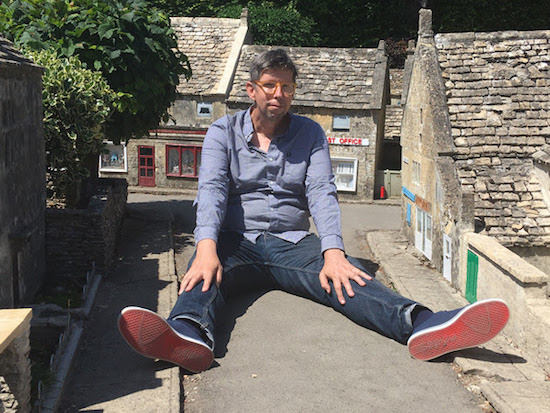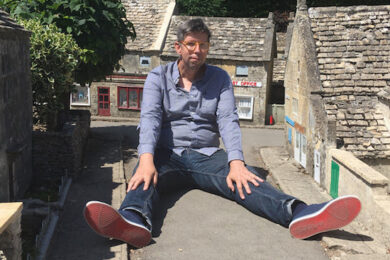In recent years there’s been a strange and unwelcome twist in the way we remember those who died in the First World War. Now that people who fought have passed beyond living memory, the territory is ripe for exploitation by those who would seek to use the commemorations for jingoistic, nationalist ends. With this, mass memory has become ever-more vulgar and ostentatious. Rather than a veteran selling the simple paper poppies of yore, British Legion tables at our mainline stations are covered with ever-larger and more elaborate blooms. Meanwhile, as the Twitter account giant poppy watch points out, more and more brands, sports clubs and the like are cashing in on ‘remembering our brave boys’ in the most cynical way. Some people have even started decorating the fronts of their houses with mock-ups and dioramas of the trenches, something the writer Tim Burrows has rather brilliantly called "war Christmas". All of which is why Darren Hayman’s Thankful Villages project has been a welcome, reflective intercession into this increasingly vulgar season. Hayman is putting Thankful Villages to rest this week with a third album in the series and concerts in London and Newcastle. What makes this project so interesting, and relevant today, is how it doesn’t really deal with war and death at all, at least directly. The Thankful Villages that Hayman has spent the last few years visiting, recording songs about, and shooting films in, are the places in the UK in which all the servicemen returned from the conflict alive. Remarkably, there are only 54 (at last count) out of 60,000 settlements which lost young men.
So instead of a musical parade of songs about the war, Hayman has chosen instead to create thoughtful meditations on rural life, change, and lost ways of being. "We are not spending half an hour saluting our troops," he says. "There’s the war – the subject on the surface – but what’s underneath is what I’m really writing about." Therefore the Thankful Villages series contains a terrific array of subjects, ranging from the closure of local schools (a big theme of the final album), love affairs, Nazi vicars, swimming accidents, disused railways and even a huge explosion that scattered body parts over the local area. It’s certainly a celebration of the idea that nowhere is ever really a boring place.
Hayman tells me that most of the villagers that he spoke to on his travels were very welcoming of his unusual project. One vicar did say that he didn’t think that the locals would be willing to talk to him. "I realised we didn’t live in feudal times, and the rector couldn’t decide whether or not someone had permission to talk to his flock," Hayman says. "So I went to the fireworks display there and after that it was fine."
Last summer, I drove with Darren Hayman to the Thankful Village of Minting in Lincolnshire, population 286. Ten Minting men went to war between the years 1914 and 1918, and ten came back. In World War Two ten went and only nine came back. In the village hall, Hayman’s merch sits next to the local historian’s collection – a bronze axe head, clipped coins, a medieval seal. The noticeboard gives flood warning information, and a leaflet asks residents to help tackle dog fouling. A tractor goes past along the lane, the rattle and chatter disrupting the acoustic guitar and warm, meandering stories from the front of the hall. Children sit at the back pressing a little too hard with their felt tips as they draw. There’s a good crowd along, tucking in to an afternoon tea while they enjoy the concert of off-kilter song.
Minting, Lincolnshire – Thankful Villages #41 from Darren Hayman on Vimeo.
Hayman’s previous albums have been themed around subjects as diverse as the East Anglian witch trials of the 17th century, post-war new towns, and lidos. So why does he feel so drawn to picking a subject to write about? "I like the idea of setting up a system, and seeing what that system creates," he says. "I love setting myself a brief. There could’ve been 54 interesting stories about 54 different villages, but it’s just that I used the filter of the Thankful Villages to find them. It’s what I’m addicted to now – rules. Sometimes there’s rules within the rules, musical rules on albums, like, ‘I am not allowed to use chords.’ There’s actually a limited palette of instruments on Thankful Villages."
Was there a personal element to the project? "These trips have become my refuge, my escape," he says. "I have had crises and just got in the car and looked for a village I haven’t done, and driven for five hours to find a Travelodge when I got there. So I’ve quite literally ran away to them sometimes. Abby, my girlfriend, has only known me while doing Thankful Villages, and I think she’s a little bit scared of ‘what Darren might be without it’."
Yet if the Thankful Villages project was a reaction to difficult situations Hayman had found himself in, he wanted the albums to have a positive sentiment. "I quite liked that dichotomy where I wanted the record to reflect the title," he says. "So I wanted them to about good things, and I wanted them to be ultimately uplifting, even if when it’s Dennis talking about 14 people drowning."
It’s Dennis from Cromwell who rather exemplifies the collection of people who inhabit this strange and eccentric sonic Camberwick Green that Hayman has created. Dennis asked if he’d been to the dolls museum. "That’s where we used to lay out the bodies," he announced out of nowhere, explaining that it had been the village morgue: "is this the sort of thing you want?" It therefore became a song:
The characters of the Thankful Villages are people who have lived lives at human speed, unfretted by the modern anxiety of social media. Back to Dennis again. "Even though it’s about death, there’s something very comforting about the way he tells it," Hayman says, "it is quite comforting, to have someone who is genuinely from the ‘school of hard knocks’, to say something about how people die, but life carries on."
Thankful Villages is inspired as much by this ordinariness as it is trying to make grand statements about the First World War, or its political legacy, as Hayman explains: "quite a lot of the second album had a lot of death. Although it sometimes attracts me like a magnet I try to avoid that ‘dark country’ trope. Sometimes you just can’t ignore it, because they’re really good stories, and everyone loves a ‘devil under a bridge’ in a rural landscape. But I just quite liked the ordinary-ness of someone talking about a hobby." And so Minting Village Hall and eventually that table where vinyl shares space with rusted old artefacts, led to Hayman finding out about a local metal detectorist sharing his finds,
"He just told the story about wanting a metal detector when he was a kid, and asking his mum and dad for one, a really ordinary story," Hayman says. "A kid that wanted a metal detector – there’s nothing bizarre about it. It’s a nice feeling I get when it is quite ordinary, but hasn’t been put to record before." Hayman adds that at one point he’d wanted to glean source material simply by asking what his interviewees had done the day before. This is what Thankful Villages is about – the disruption of ordinariness by four years of cataclysmic violence, and the echoes that are still felt today.
Why does he think these places are still so in touch with their status as Thankful Villages? "I think smaller communities are better at remembering," Hayman says. "I think that in London we only have to dig somewhere and there’s bound to be something underneath. We know it’s all hidden, but London forgets. I think a village, by nature of having a smaller and less transient population, remembers. I think that the war has a greater significance to these people than it would do to us, even to people our age in the village. And I think that the fact that they survived it does, as well. I’ve been a bit reluctant to admit that. I’m finding it easier to talk about this project now that I’m at the end of it. When I was starting out, I was just like, ‘I don’t want this to be too much about the war’, and I was a little bit cautious about doing that spurious psychogeography thing, where you go in and you say, ‘Aren’t all these people thankful in some way’ and making these connections that aren’t actually there."
Has the project changed Hayman’s opinion of the countryside? "There are certain assumptions you make about religion and conservatism, and the rural landscape," he says. "It’s not wrong to make that assumption. Look at a political map of Britain: the rural areas are all Tory blue. I think that there’s something about the way I contact these villages, I’m often passed to the ‘most liberal guy in the village’ to talk to. I think there was a point in my life when I was quite anti-country, now I could possibly live there. I definitely am much more attracted to the idea than I used to be. I’ve lost a bit of my city snobbery."
Thankful Villages Volume Three is released on 9 November – preorder here. Hayman plays at Thankful Villages special set at Daylight Music at the Union Chapel in London on Saturday, 10 November, and 100 Years (a commemoration of the end of WWI also featuring Shirley Collins, British Sea Power, Bas Jan, Richard Dawson and a special installation by Chris Watson, on the 11th – for more information about that go here



